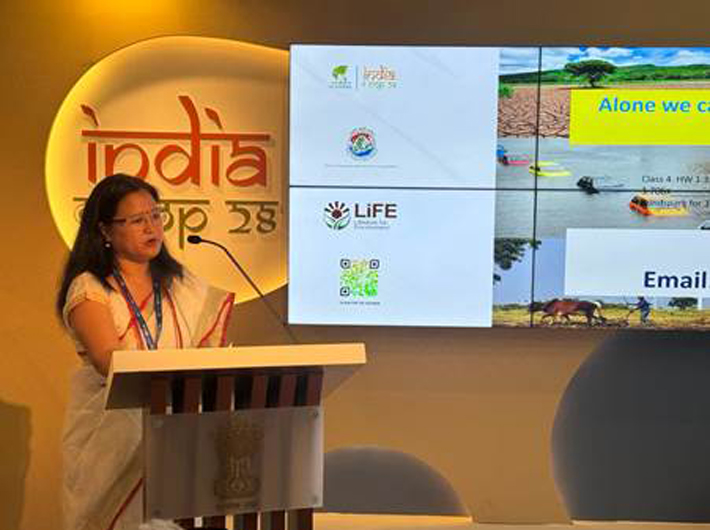At Indian side event, the necessity for immediate action in the face of worsening impacts of climate change underscored
Impacts and implications of Climate Change Vulnerability in the Himalayan Region and ways of creating ‘Climate Resilient Development in Indian Himalayan Region by making mountain communities green and resilient were discussed the side event hosted at the India pavilion at the UN Climate Conference COP 28.
Dr Anita Gupta, Head, Climate Change and Clean Energy Division, who led the discussions at the two sessions at the side event on December 3, underscored the necessity for immediate action in the face of worsening impacts of climate change and briefed the international audience about India’s Climate Change Initiatives at the side event organised by the Department of Science and Technology (DST), an official release said on Monday.
During the first session, representatives from Switzerland Development Corporation (SDC); International Centre for Integrated Mountain Development (ICIMOD), Nepal; Directorate of Environment and Climate Change, Manipur, India; GBPNIHE, Almora, India and DST, India deliberated about the Climate Change Programme (CCP) under National Action Plan on Climate Change of government of India; Vulnerability and Risk Assessment in India; regional perspective on Cryosphere; Climate risk profile for adaptation plan in Manipur state; and inclusive climate actions for sustainable development of IHR, respectively.
In the second session, co-hosted with the Government of Himachal Pradesh, representatives from DST, showcased the initiatives under National Mission on Sustaining the Himalayan Ecosystem while the representatives from Govt. of Himachal Pradesh spoke about present climate policy interventions; Climate Risk Assessment (CRA) for transition towards – development of ecologically oriented resilient villages with climate-resilient practices in agriculture and horticulture.
The 28th Conference of Parties is being held at Dubai, in the United Arab Emirates (UAE), from 30 November until 12 December, where the representatives from 197 countries are showcasing and their efforts to limit global warming and prepare for future climate change. This is the first time where countries formally assess their progress under the 2015 Paris climate agreement.
The delegates at COP 28 also discussed adaptation and mitigation efforts in order to achieve the significant positive outcomes in the coming years towards tackling climate change. Such efforts are especially crucial for countries that are highly vulnerable and also for the fragile ecosystems of the world such as Himalayan Mountain range in Asia.
The climate of India is highly dependent on Himalayan range and Indian Himalayan region (IHR) has been a shelter for more than 50 million people. Any impact in the Himalayas would mean an effect on the life of millions of people not only of India but also of entire subcontinent. These include changes on account of natural causes, climate change resulting from anthropogenic emissions and developmental pathways. Hence it becomes crucial to assess the vulnerability of the Indian Himalayan region.
The experts at the side event elaborated on the importance of the National Mission for Sustaining the Himalayan Ecosystem (NMSHE) launched as part of National Action Plan on Climate Change (NAPCC), to better understand the linkages between climate change and the Himalayan ecosystem for improved adaptation. DST officials like Dr Susheela Negi and other domain experts interacted on ways to take this mission which the Department of Science & Technology (DST) is coordinating, implementing and monitoring the mission in collaboration with several other central ministries and all Himalayan States/Union territories, forward for long term solutions to climate change.
